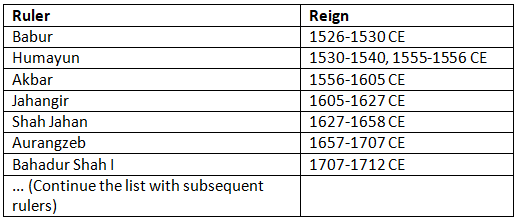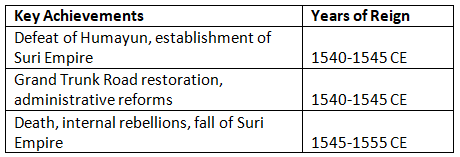UPSC Exam > UPSC Notes > History for UPSC CSE > Cheat Sheet: The Mughal Empire
Cheat Sheet: The Mughal Empire | History for UPSC CSE PDF Download
Introduction
The Mughal Empire, founded by Babur, evolved into a powerful dynasty that lasted for about two centuries. This chronology document outlines the key rulers, major battles, and administrative features of the Mughal Empire, from its inception to its decline.
Mughal Rulers and Timeline

Babur's Wars

Evaluation of Babur’s Regime
- Kabul and Qandahar integrated into north India for the first time since the Kushan Empire.
- Introduction of gunpowder and artillery in Indian warfare.
- Baburnama reveals military strategies, multilingualism, and cultural contributions.
Humayun's Reign

Sher Shah Suri

Akbar's Expansion and Administration

Jahangir's Reign

Shah Jahan's Era

Aurangzeb's Reign

Conclusion
The Mughal Empire, with its diverse rulers and dynamic history, left an indelible mark on the Indian subcontinent. From Babur's conquests to the cultural richness of Shah Jahan's era and the challenges faced during Aurangzeb's rule, the chronology showcases the rise and fall of a mighty empire that shaped the course of Indian history.
The document Cheat Sheet: The Mughal Empire | History for UPSC CSE is a part of the UPSC Course History for UPSC CSE.
All you need of UPSC at this link: UPSC
|
226 videos|855 docs|219 tests
|
FAQs on Cheat Sheet: The Mughal Empire - History for UPSC CSE
| 1. What is the Mughal Empire and what was its significance in Indian history? |  |
Ans. The Mughal Empire was a powerful empire that ruled over a large part of the Indian subcontinent from the early 16th century to the mid-19th century. It was founded by Babur and reached its peak under the reign of Emperor Akbar. The Mughal Empire played a crucial role in shaping the cultural, architectural, and political landscape of India. It left a lasting impact on Indian society and its legacy can still be seen today.
| 2. Who were the major rulers of the Mughal Empire and what were their contributions? |  |
Ans. The major rulers of the Mughal Empire were Babur, Humayun, Akbar, Jahangir, Shah Jahan, and Aurangzeb.
Babur was the founder of the Mughal Empire and his reign marked the beginning of Mughal rule in India. He established a strong foundation for the empire and laid the groundwork for future Mughal rulers.
Humayun, though he faced challenges and lost the empire to Sher Shah Suri, managed to regain it and expanded its territories. He also played a significant role in promoting art and culture during his reign.
Akbar is considered one of the greatest Mughal emperors. He expanded the empire to its greatest extent and introduced many administrative reforms. He was known for his policy of religious tolerance and his efforts to promote harmony among different religious communities.
Jahangir continued the policies of his father Akbar and focused on promoting art and culture. He also had a keen interest in painting and his court was known for its patronage of artists.
Shah Jahan is known for his architectural achievements, most notably the construction of the Taj Mahal. He also maintained a strong centralized administration and expanded the empire's territories.
Aurangzeb, though he expanded the empire further, is often criticized for his religious policies and his strict adherence to orthodox Sunni Islam. His reign marked the beginning of the decline of the Mughal Empire.
| 3. What were the major wars fought during Babur's reign and how did they shape the Mughal Empire? |  |
Ans. Babur fought several wars during his reign, including the Battle of Panipat in 1526, where he defeated the Sultan of Delhi, Ibrahim Lodi, and established his rule in North India. He also faced challenges from the Rajput confederacy led by Rana Sanga of Mewar. The Battle of Khanwa in 1527 was a crucial victory for Babur, as it further solidified his control over North India. Babur's wars were instrumental in establishing the Mughal Empire and laying the foundation for future Mughal rulers.
| 4. How did Sher Shah Suri impact the Mughal Empire? |  |
Ans. Sher Shah Suri, also known as Sher Khan, was a powerful ruler who briefly overthrew the Mughal Empire and established the Sur Empire in North India. He is known for his administrative and infrastructural reforms, including the introduction of the Grand Trunk Road and the improvement of the administrative system. Sher Shah Suri's reign had a significant impact on the Mughal Empire as it forced Humayun to flee and later influenced the administrative policies of Akbar.
| 5. What were the major accomplishments of Emperor Akbar and how did they shape the Mughal Empire? |  |
Ans. Emperor Akbar's reign was marked by numerous accomplishments that had a profound impact on the Mughal Empire. He expanded the empire to its greatest extent, incorporating several regions of North India. Akbar introduced several administrative reforms, including the establishment of a centralized bureaucracy and a system of revenue administration. He also pursued a policy of religious tolerance, promoting harmony among different religious communities. Akbar's reign laid the foundation for a strong and prosperous Mughal Empire, with his policies setting a precedent for future rulers.
Related Searches
















